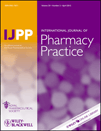Evaluation of a multi staged professional development course for practising pharmacists in anticoagulation management
Abstract
Background With the evolution of pharmacist prescriptive authority in Alberta, Canada, professional development courses need to impact change in daily practice. We designed a multi stage course targeting anticoagulation management with several components: (1) a print-based course to develop foundational knowledge; (2) a 2-day workshop; (3) a 3-day experiential programme; (4) distance mentorship to practice site; and (5) two full-day mentorship meetings.
Objective To assess the impact of a comprehensive anticoagulation professional development course on practising pharmacists' knowledge, confidence and daily practice, with documentation of resources for the mentorship phases.
Methods A mixed method of evaluation using surveys to assess pharmacist knowledge and confidence and semi-structured interviews to assess the impact on practice. Surveys were conducted prior to and following the workshop, after the experiential training and 4–6 months following completion of the workshop. Interviews were conducted following the experiential training and 4–6 months after the workshop.
Results Enrolment for the complete multi stage course was limited to 12 pharmacists, while another 59 completed the course to the end of the workshop. Pharmacists completing the entire course had improved knowledge scores following the workshop, and between the workshop and 3-day experiential. These scores declined at 4–6 months. Improvements in confidence occurred throughout the course. At the final interview, all pharmacists indicated a positive impact on their practice. Mentorship was feasible and imperative to offer security to facilitate practice change.
Conclusions Overall, this comprehensive multi stage course improved knowledge, confidence and practice for pharmacists.




